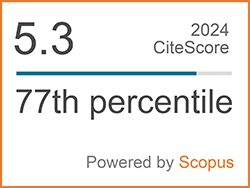Numerical Modeling for Corrosion Rate between Heat-affected Zone and Unaffected Base Metal of Galvanized Steel Welded by Brazing
Abstract
Brazing of galvanized steel causes decaying of the zinc coating and decreasing of corrosion resistance on heat-affected zone (HAZ) and weldment. The corrosion rates among the HAZ, unaffected base metal (UBM), and weldment of galvanized steel welded by brazing were numerically modeled by COMSOL Multiphysics. The numerically modeled current density values from various zones, such as the couples between the HAZ and the UBM, between the weldment and the HAZ, and between the UBM and steel were used to calculate the corrosion rates. In this work, two different methods based on Faraday’s Law, the mixed potential theory and the Numerical modeling, were compared for calculations of the corrosion rates of each region. Using the mixed potential theory, the calculated corrosion rates of regions I, II, III, IV, V and VI were 0.853, 0.284, 2.105,1.754, 2.028 and 0.554 mm/y, respectively. Where as based on the Numerical modeling, these rates of all regions were 0.918, 0.275, 2.198, 1.904, 2.151, and 0.566 mm/y, in orderly. These comparisons suggested that the corrosion rates obtained from the two methods were similar. However, the results showed that the Numerical modeling method could predict the corrosion rate with less error.
Keywords
[1] J. C. Lippold, Corrosion. In Welding Metallurgy and Weld Ability. New Jersey: John Wiley & Sons, Inc, 2015, pp. 263–287.
[2] B. N. Popov, Galvanic Corrosion, Corrosion Engineering. Amsterdam, Netherlands: Elsevier, 2015, pp. 239–287.
[3] T. Wattanasrisin, “Effects of MIG welding current in brazing process on mechanical properties and microstructure of galvanized steel brazing seam,” The Journal of Industrial Technology, vol. 12, no. 3, pp. 73–86, Sep. 2016.
[4] A. D. King, J. S. Lee, and J. R. Scully, “Finite element analysis of the galvanic couple current and potential distribution between Mg and 2024- T351 in a Mg rich primer configuration,” Journal of the Electrochemical Society, vol. 163, no. 7, pp. 342–356, 2016.
[5] F. Cui, F. J. Presuel-Moreno, and R. G. Kelly, “Computational modeling of cathode limitations on localized corrosion of wetted SS 316L at room temperature,” Corrosion Science, vol. 47, no. 12, pp. 2987–3005, 2005.
[6] E. J. F. Dickinson, H. Ekström, and E. Fontes, “COMSOL Multiphysics®: Finite element software for electrochemical analysis. A minireview,” Electrochemistry Communications, vol. 40, pp. 71–74, 2014.
[7] L. Y. Xu and Y. F. Cheng, “Development of a finite element model for simulation and prediction of mechano-electrochemical effect of pipeline corrosion,” Corrosion Science, vol. 73, pp. 150– 160, 2013.
[8] K. B. Deshpande, “Validated numerical modelling of galvanic corrosion for couples: Magnesium alloy (AE44)–mild steel and AE44–aluminum alloy (AA6063) in brine solution,” Corrosion Science, vol. 52, no. 10, pp. 3514–3522, Jul. 2010.
[9] K. B. Deshpande, “Numerical modeling of microgalvanic corrosion,” Electrochimica Acta, vol. 56, no. 4, pp. 1737–1745, Sep. 2011.
[10] K. B. Deshpande, “Effect of aluminum spacer on galvanic corrosion between magnesium and mild steel using numerical model and SVET experiments,” Corrosion Science, vol. 62, pp. 184– 191, May 2012.
[11] Y. Lu, H. Jing, Y. Han, and L. Xu, “Numerical modeling of weld joint corrosion,” Journal of Materials Engineering and Performance, vol. 25, no. 3, pp. 960–965, Jan. 2016.
[12] H. C. Lin, C. A. Hsu, C. S. Lee, T. Y. Kuo, and S. L. Jeng, “Effects of zinc layer thickness on resistance spot welding of galvanized mild steel,” Journal of Materials Processing Technology, vol. 251, pp. 205–213, 2018.
[13] S. K. Thamida, “Modeling and simulation of galvanic corrosion pit as a moving boundary problem,” Computational Materials Science, vol. 65, pp. 269–275, 2012.
[14] N. Murer, R. Oltra, B. Vuillemin, and O. Néel, “Numerical modelling of the galvanic coupling in aluminum alloys: A discussion on the application of local probe techniques,” Corrosion Science, vol. 52, no. 1, pp. 130–139, 2010.
[15] S. R. Cross, S. Gollapudi, and C. A. Schuh, “Validated numerical modeling of galvanic corrosion of zinc and aluminum coatings,” Corrosion Science, vol. 88, pp. 226–233, 2014.
DOI: 10.14416/j.asep.2021.03.001
Refbacks
- There are currently no refbacks.
 Applied Science and Engineering Progress
Applied Science and Engineering Progress







